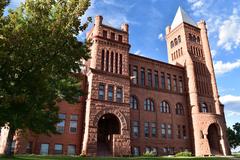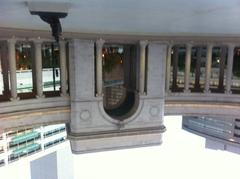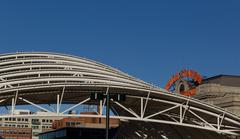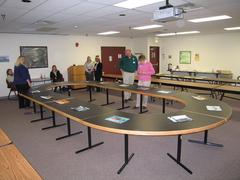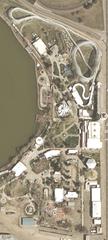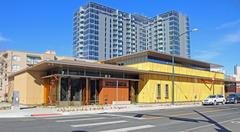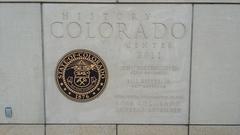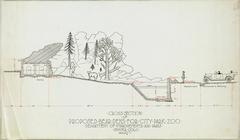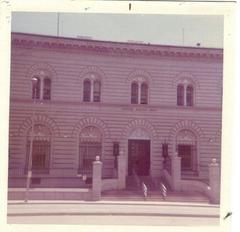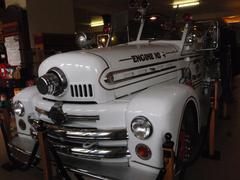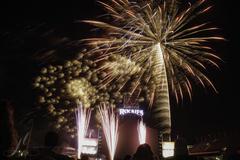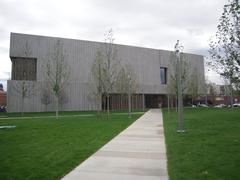Visiting Four Mile Historic Park in Denver: Hours, Tickets, and Tips
Date: 24/07/2024
Introduction
Nestled in the Denver suburb of Glendale, Four Mile Historic Park stands as a testament to the pioneering spirit of the American West. This 12-acre site offers visitors a rare glimpse into the lives of early settlers through the preservation of the Four Mile House, Denver’s oldest standing structure, built in 1859. The park’s rich history, from its role as a crucial stagecoach stop along the Cherokee Trail to its architectural and cultural significance, makes it a vital link to Denver’s past (Atlas Obscura).
Four Mile Historic Park serves as more than just a historical site; it’s a living museum that brings history to life through interactive educational programs, seasonal events, and hands-on activities. Visitors can explore meticulously recreated pioneer structures, engage with a working farm, and participate in traditional crafts and pioneer cooking classes. This comprehensive guide aims to provide all the information you need for an enriching visit, including the park’s history, visiting hours, ticket prices, and practical travel tips.
Table of Contents
- Introduction
- History and Significance of Four Mile Historic Park
- Visitor Information
- Significance in the Context of Denver’s Development
- Conclusion
- Frequently Asked Questions (FAQ)
History and Significance of Four Mile Historic Park
Origins and Early History
The Four Mile Historic Park, located on the outskirts of Denver in the suburb of Glendale, is a 12-acre site that offers a glimpse into the pioneering days of the American West. The park’s centerpiece, the Four Mile House, is the oldest standing structure in the Denver area, dating back to 1859. This historic gem was originally settled by the Brantner brothers, who were among the early pioneers to establish a homestead in the region (Atlas Obscura).
The Cherokee Trail and Mile Houses
The Four Mile House served as a crucial stagecoach stop and dance hall for travelers along the Cherokee Trail. This trail was a significant route for pioneers moving westward, and the Four Mile House was the last in a series of “mile houses” before reaching Denver. These mile houses were named based on their distance from the fledgling town of Denver. The series included the Four, Seven, Nine, Twelve, Seventeen, and Twenty Mile Houses. Of these, only the Seventeen Mile House still stands today (Atlas Obscura).
Architectural and Cultural Significance
The Four Mile House is not just a relic of the past; it is a testament to the architectural styles and building techniques of the mid-19th century. The structure has been meticulously preserved to maintain its historical integrity, offering visitors a tangible connection to the era of westward expansion. The house and its surrounding outbuildings, including barns and a blacksmith shop, provide a comprehensive look at the daily lives of early settlers.
Preservation Efforts
The preservation of Four Mile Historic Park has been a community effort, supported by various historical societies and local government initiatives. The park’s maintenance and restoration projects aim to keep the site as authentic as possible, ensuring that future generations can experience this slice of history. The park’s rustic outbuildings and quiet grounds create an atmosphere that transports visitors back in time, making it a unique educational resource.
Educational Programs and Events
Four Mile Historic Park is not just a static historical site; it is a living history museum that offers a variety of educational programs and events. These programs are designed to engage visitors of all ages, providing hands-on experiences that bring history to life. Activities include blacksmithing demonstrations, pioneer cooking classes, and guided tours of the homestead. Seasonal events, such as harvest festivals and holiday celebrations, further enrich the visitor experience (Atlas Obscura).
Visitor Information
Hours and Tickets
To make the most of your visit to Four Mile Historic Park, it’s essential to know the practical details. The park is generally open from Tuesday to Sunday, 10 AM to 4 PM. Ticket prices are as follows:
- Adults: $10
- Seniors (65+): $8
- Youth (7-17): $6
- Children (6 and under): Free
For the most current information, please check the Four Mile Historic Park official website.
Accessibility and Visitor Experience
While the park offers a rich historical experience, it is important to note that the terrain can be somewhat rugged. The unpaved gravel and mulch paths may pose challenges for visitors with mobility issues. However, the park’s layout and design aim to be as inclusive as possible, with efforts continually being made to improve accessibility.
Travel Tips
- Best Time to Visit: Spring and fall offer mild weather and fewer crowds, making them ideal times for a visit.
- What to Wear: Comfortable walking shoes are recommended due to the park’s uneven terrain.
- Nearby Attractions: Consider visiting other nearby Denver historical sites such as the Molly Brown House Museum and the Colorado State Capitol.
Special Events and Photographic Spots
The park hosts several special events throughout the year, including harvest festivals, holiday celebrations, and historical reenactments. These events are perfect opportunities for photography, with the park’s historic buildings and natural landscapes providing beautiful backdrops.
Significance in the Context of Denver’s Development
The Four Mile Historic Park holds a special place in the history of Denver’s development. As the last stop before reaching Denver on the Cherokee Trail, the Four Mile House played a pivotal role in the city’s early growth. It served as a hub for travelers and a center for community gatherings, contributing to the social and economic fabric of the region. The park’s preservation allows visitors to appreciate the challenges and triumphs of the pioneers who helped shape Denver into the city it is today.
Conclusion
The Four Mile Historic Park is a vital link to Denver’s past, offering a well-preserved window into the lives of early settlers. Its historical and cultural significance, combined with its educational programs and events, make it a must-visit destination for anyone interested in the history of the American West. The park’s ongoing preservation efforts ensure that this important piece of history will continue to be accessible to future generations.
For more information, visit the Four Mile Historic Park page on Atlas Obscura.
Frequently Asked Questions (FAQ)
What are the visiting hours for Four Mile Historic Park?
The park is generally open from Tuesday to Sunday, 10 AM to 4 PM. It is advisable to check the official website for any changes in hours.
How much are the tickets for Four Mile Historic Park?
- Adults: $10
- Seniors (65+): $8
- Youth (7-17): $6
- Children (6 and under): Free
Is Four Mile Historic Park accessible for visitors with mobility issues?
While the park’s terrain is somewhat rugged with unpaved gravel and mulch paths, efforts are continually being made to improve accessibility.
Are there any special events at Four Mile Historic Park?
Yes, the park hosts various seasonal events such as harvest festivals, holiday celebrations, and historical reenactments.
What other historical sites can I visit near Four Mile Historic Park?
Nearby Denver historical sites include the Molly Brown House Museum and the Colorado State Capitol.
Call to Action
Plan your visit to Four Mile Historic Park today to experience a unique piece of Denver’s history. For more updates and information, follow us on social media or check out our other related posts.
